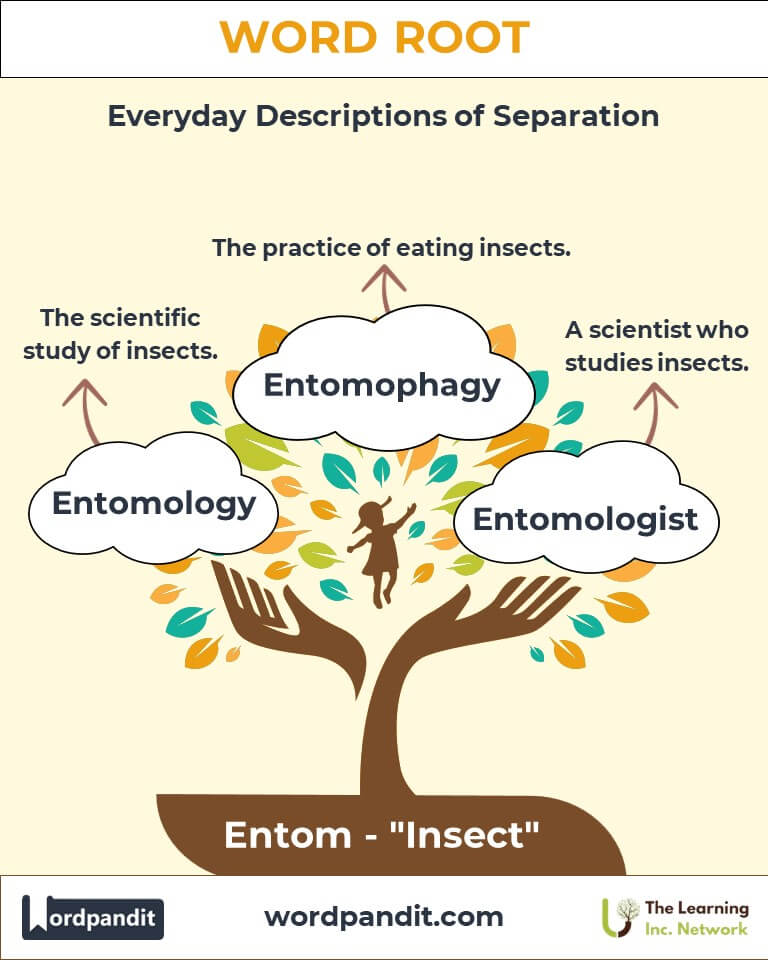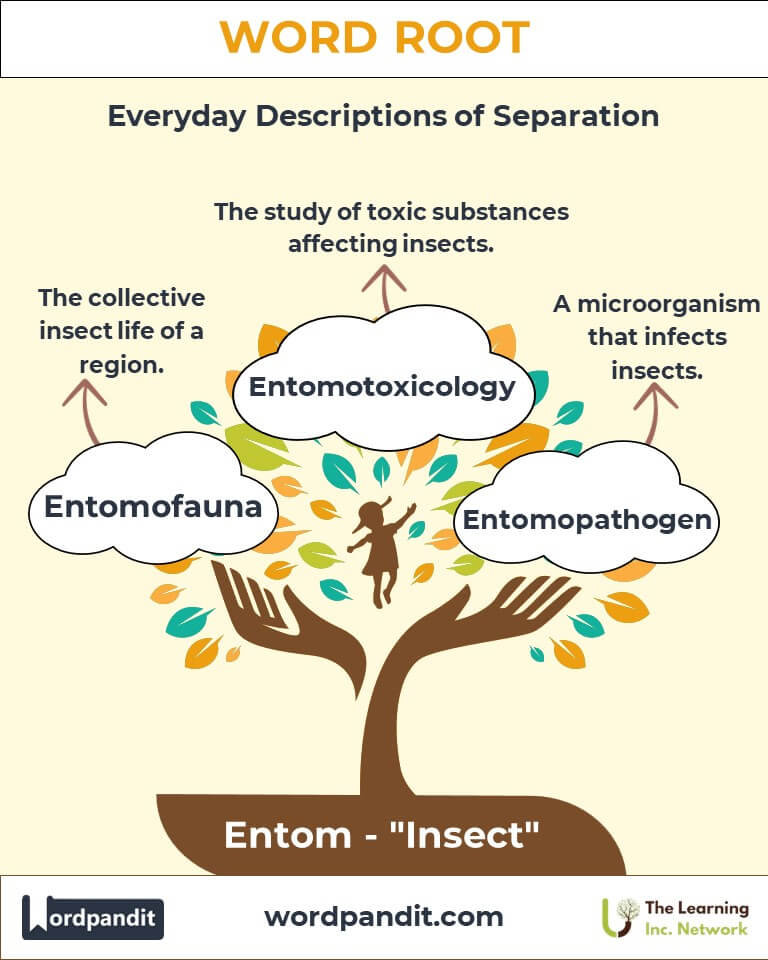Entom: The Study of Insects in Language and Science
Delve into the fascinating root "Entom," derived from the Greek word entomon, meaning "insect." From entomology to entomophobia, this root underpins a lexicon that connects us to the microcosm of insects and their profound influence on ecosystems, science, and culture.

Table of Contents
- Introduction: The Essence of "Entom"
- Etymology and Historical Journey
- Mnemonic: Unlocking the Power of "Entom"
- Common Entom-Related Terms
- "Entom" Through Time
- "Entom" in Specialized Fields
- Illustrative Story: "Entom" in Action
- Cultural Significance of "Entom"
- The "Entom" Family Tree
- FAQs about the "Entom" Word Root
- Test Your Knowledge: "Entom" Mastery Quiz
- Conclusion: The Living Legacy of "Entom"
Introduction: The Essence of "Entom"
What comes to mind when you hear the word "insect"? Perhaps the delicate flutter of a butterfly or the industrious buzz of a bee. The root "Entom," pronounced en-tom, originates from the Greek entomon, meaning "insect." This root forms the basis for terms that explore the incredible diversity and roles of insects in our world. "Entom" is a cornerstone in understanding the tiny creatures that shape ecosystems and inspire scientific discovery.

Etymology and Historical Journey
The word "Entom" stems from the Greek entomon (en = in, tomos = cut), referring to the segmented body of insects. This concept became a foundation for Aristotle’s biological classifications in ancient Greece. Over time, the study of insects—entomology—emerged as a crucial discipline within natural sciences, influencing taxonomy, agriculture, and even literature.
Mnemonic: Unlocking the Power of "Entom"
To remember "Entom," visualize a magnifying glass examining the intricate wings of a dragonfly. This image captures the essence of "Entom" as a lens through which we study the insect world.
Mnemonic Device: "Entom examines tiny tomes of life in every segment."
Common Entom-Related Terms
- Entomology: The scientific study of insects. Example: "She pursued a degree in entomology to understand pollination dynamics."
- Entomologist: A scientist who specializes in entomology. Example: "The entomologist identified a rare species of beetle in the rainforest."
- Entomophobia: The fear of insects. Example: "His entomophobia kept him away from gardens and parks."
- Entomophagous: Describing organisms, including humans, that eat insects. Example: "Entomophagous diets are becoming popular as sustainable food options."
- Entomofauna: The insect population within a specific region. Example: "The entomofauna of the Amazon rainforest includes thousands of unique species."
"Entom" Through Time
Entomology: First formalized during the Renaissance, it expanded in the 19th century with the invention of microscopes, enabling detailed studies of insect anatomy.
Entomophagy: Historically practiced in many cultures, it is now gaining attention as an eco-friendly protein source.
"Entom" in Specialized Fields
- Agriculture: Entomopathogenic fungi are used to control insect pests naturally.
- Medicine: Insect venoms inspire treatments for conditions like arthritis.
- Ecology: Entomofauna studies reveal the health of ecosystems and biodiversity.
- Cuisine: Entomophagy offers a sustainable alternative to traditional protein sources.
Illustrative Story: "Entom" in Action
Dr. Clara, an entomologist, embarked on a mission to protect crops from invasive pests. Using her expertise, she introduced entomopathogenic fungi that targeted pests without harming other insects. Her success demonstrated the critical role of entomology in sustainable agriculture.
Cultural Significance of "Entom"
Insects appear in art, literature, and folklore, symbolizing transformation (butterflies), industriousness (ants), or chaos (locusts). The entomological perspective enriches our appreciation of their roles in mythology and storytelling.

The "Entom" Family Tree
- Tomos (cut): Anatomy, atom.
- Insect (in + sect, divided): Insecta.
- Phobia (fear): Arachnophobia, claustrophobia.

FAQs About the Entom Word Root
Q: What does "Entom" mean?
A: "Entom" is derived from the Greek word entomon, meaning "insect." It refers to creatures with segmented bodies, such as ants, bees, and butterflies.
Q: What is entomology?
A: Entomology is the scientific study of insects. It explores their biology, behavior, and roles in ecosystems, influencing agriculture, biodiversity, and pest control.
Q: What is entomophobia?
A: Entomophobia is the irrational fear of insects. It ranges from mild discomfort to severe anxiety and can be managed with therapy or gradual exposure techniques.
Q: What is entomophagy?
A: Entomophagy is the practice of eating insects, which has been common in many cultures for centuries. Today, it is promoted as a sustainable protein source due to its low environmental impact.
Q: How do insects benefit ecosystems?
A: Insects are crucial for pollination, decomposition, and forming the foundation of food webs. They help sustain biodiversity and maintain ecological balance.
Test Your Knowledge: Entom Mastery Quiz
1. What does the root "Entom" mean?
2. Who studies insects?
3. What is the fear of insects called?
4. Which term describes eating insects?
5. What does "Entomofauna" refer to?

Conclusion: The Living Legacy of "Entom"
The root "Entom" unlocks the mysteries of insects and their vital roles in our world. From agriculture to medicine and culture, the study of "Entom" reveals a microcosm of life’s complexity and resilience.













